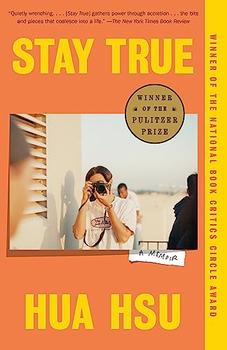Page 1 of 1
There are currently 3 reader reviews for Stay True
Write your own review!
Ravi Chandra
Important book at this time to highlight young men's friendships
Hua Hsu’s Stay True is a memoir about collegiate friendship, but also a cultural and mental health intervention, emphasizing that we stay true to the people in our lives and what truly sustains us. It is of particular interest for Asian American men and those who care about them. This review also contains particular notes for Asian American grief, and some snark thrown at therapists by Asian American memoirists!
 Anthony Conty
90s Nostalgia Wrapped in Tragedy
Anthony Conty
90s Nostalgia Wrapped in Tragedy
“Stay True” by Hua Hsu won the Pulitzer this year for Memoir/Autobiography, a new category I was excited to see. It is partly about being the son of immigrants, part a recollection of the 90s and part about grief and loss. The children of immigrants will relate to the beginning, and any 90s kids will identify with the alternative music zines the author writes.
Hsu develops a friendship with Ken that you will recognize from your college days: he is too “preppy” and “cookie-cutter,” but they form a bond based on proximity. If you went to college in the mid-1990s, their pop culture conversations would make you cringe with recognition, but the philosophy discussions are beyond anything I produced in those days.
As a college student in that decade, I struggled to find an identity through music. I liked the popular songs by edgy bands, and Hua struggles to reconcile liking what others do. My age bracket may relate to this more than others. 90s kids struggled to find an appropriate identity and blend in without conforming. It sounds paradoxical, but to me, it made sense.
When we reach the halfway point, where Hua and Ken are still discussing music, philosophers, and film, we realize that the writer focuses on life instead of death. When the deadly carjacking occurs, we have already grown attached to Ken and see why this untimely demise hit Hua so hard. He already illustrated why Ken had so much promise.
If you had not read the flap, you would not have known what was coming, and the climax would have hit harder; nonetheless, you miss Ken and realize that the songs and movies would forever remind Hua of him. After the death of a friend, how do you find meaning in the rest of the world when your loss makes everything seem secondary?
Rebecca
Boring!
I found it impossible to engage with this book. The main characters go off to university and nothing--absolutely nothing--they do is of any interest. So they wear vintage clothing. So they do stupid prankish stuff. Occasionally. So they don't always study as much as they should. I don't get it. Pulitzer reading, it's not.
